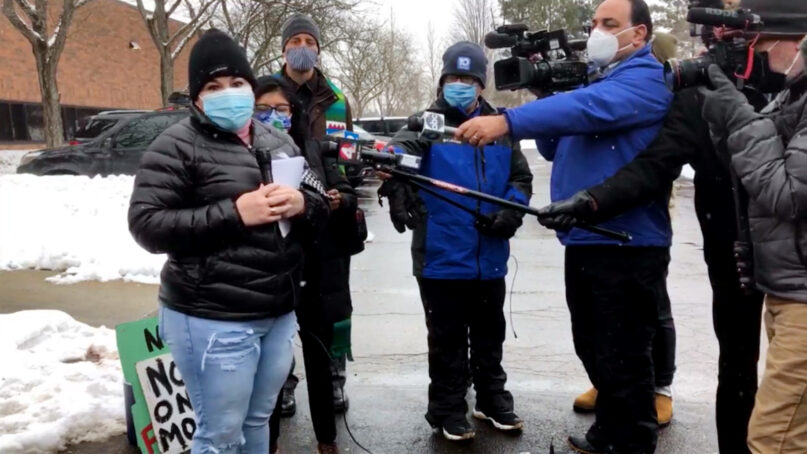(RNS) — An undocumented immigrant who had been living in an Ohio church for more than three years went home to her family Thursday (Feb. 18) after securing assurances that she will no longer be an immediate target for deportation.
Edith Espinal, a Mexican native and mother of three, had been living at the Columbus Mennonite Church since Oct. 2, 2017. Thursday morning, she and six allies walked into a local Immigration and Customs Enforcement office, where she was granted an “order of supervision.” Under the order, she cannot be deported but must check in regularly with immigration officials.
Espinal, 43, is one of more than three dozen undocumented people who took refuge in houses of worship to ride out the Trump administration’s immigration crackdown.
RELATED: With new executive order, this immigrant is leaving church sanctuary after 3.5 years
Her last day in sanctuary came as the Biden administration formally introduced its immigration overhaul to Congress. The plan offers an eight-year path to citizenship for most of the 11 million undocumented immigrants living in the United States.
In addition, on Thursday acting ICE Director Tae Johnson issued interim guidance that restrains the department from arresting and deporting undocumented immigrants who do not pose a threat to public safety. Any enforcement that doesn’t meet that criteria will require preapproval.
Jose Chicas, 55, a native of El Salvador who had been living in a church-owned house in Durham, North Carolina, left on Jan. 22. Saheeda Nadeem, 65, an undocumented immigrant from Pakistan who had taken sanctuary at a church in Kalamazoo, Michigan, left last week.
Noel Andersen, grassroots coordinator for Church World Service, which has tracked sanctuary cases, said 36 others remain in sanctuary churches across the country.
Churches — along with schools and hospitals — are considered “sensitive locations” where federal immigration enforcement officers are unlikely to arrest, search or interview people under most circumstances.
“Faith communities around the country are rejoicing today because Edith will have her freedom,” said Andersen in an email. “She has been a fearless leader and a strong prophetic voice in the Sanctuary Movement.”
Espinal had applied for a stay of removal as soon as Biden was inaugurated but was given the order of supervision instead, said Joel Miller, pastor of the Columbus Mennonite Church. He accompanied Espinal to the ICE office on Thursday.
The order of supervision will allow her to live at home, travel freely and get a work permit, but it does not permanently resolve her deportation case. Espinal has lived in Columbus for more than 20 years.
“She was hopeful and nervous” before entering the ICE office, Miller said. “Now she’s relieved and joyous.”
Miller said his congregation would remain active as part of the new sanctuary movement.
“It’s become a really important part of our identity as a congregation,” Miller said. “Sanctuary is something we’ve come to see as a core part of our mission. It’s something we deeply believe in.”
READ: Rabbi Angela Buchdahl, “Anti-Racism as a Spiritual Practice”





